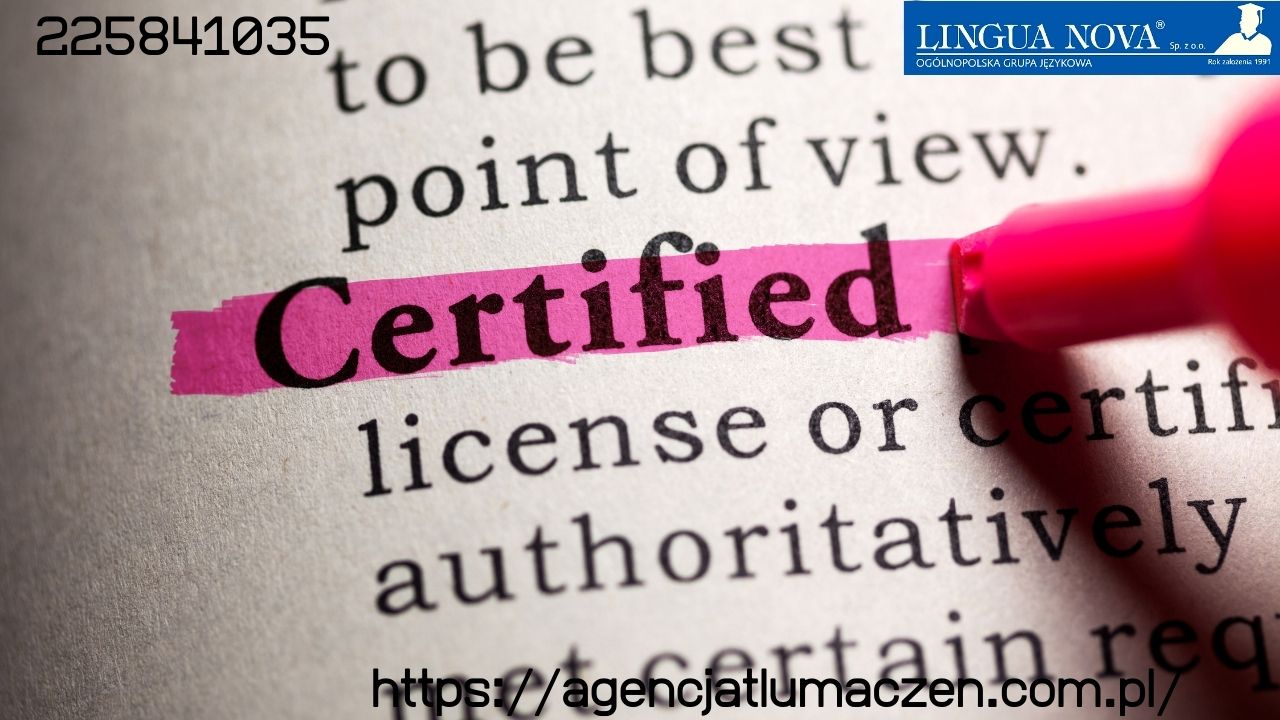What is a certified translation, sworn translation or court translation ?
A certified translation, sometimes also called sworn translation or court translation (as it is often, but not exclusively, made for the court), is a translation made by an authorized translator or interpreter, called a sworn translator/interpreter.
Certified translations must include a special formula by which the translator confirms that the translation is a true and accurate rendering of the source document presented to them. Additionally, the formula states whether the source document is an original one or whether it is a certified or uncertified copy (in paper or digital form).
The formula is always written in the target language, i.e., the language the document is translated into, although bilingual formulas might be used, too. According to Polish standards, it must also contain the number under which the translation is entered in the File Registry (or Repertory) of the Sworn Translator, and the date and place of the translation.
Certified and Uncertified Translations . Different needs, one process
For an average person, translation of a written text (as we shall focus here on written translations) might seem a piece of cake. A lot of people think it might be easily done with the assistance of various machine translation tools available online. In fact, it is a complicated creative process, requiring specialist knowledge, skills and experience.
Having worked in that field for a long time, we can boast of having all the knowledge and experience which allow us to provide our Clients with comprehensive and professional services.
Sworn translator and a round seal
Moreover, the translation is endorsed by the sworn translator’s round seal, which in Poland is tailor-made for a given sworn translator/interpreter in the Mint of Poland and contains the name and surname of the translator/interpreter, the language they are authorized to translate and the number under which the translator/interpreter is entered on the List of Sworn Translators and Interpreters kept by the Minister of Justice.
Finally, a signature of the sworn translator should be affixed, identical to the specimen signature registered at the Ministry of Justice.
The formula, together with the sworn translator’s seal and signature, is placed under the translation itself, and separated from it by typographic signs.
Presented below is a sample certification formula adapted from the Polish version specimen published by the Ministry of Justice.
xxxxxxxxxxxxxxxxxxxxxxxxxxxxxxxxxxxxxxxxxxxxxxxxxxxxxxxxxxxxxxxxxxxxxxxxxxxxxxxxxxxxxxxxxxxxxxxxxxxxxxxxxxxxxxxxxxxxxxxxx
I, the undersigned (name and surname), Sworn Translator of the English language, entered in Sworn Interpreters and Translators List of the Minister of Justice with number (TP /.. /..) hereby certify the conformity of the above translation with the original document presented to me in the Polish language.
What do we start with?
The work of a translator has many aspects. When starting cooperation with a Client, it is of key importance for us to specify at the very beginning what kind of service should be provided. It might seem obvious, but any misunderstanding could have serious consequences. So here is our little piece of advice – the terms and conditions of cooperation must be clearly specified!. It is really worthwhile.
NOT ONLY CERTIFIED TRANSLATIONS ARE CONFIDENTIAL
The key issue is trust. The privacy of our Clients and the confidentiality of translated documents are essential for us. When accepting a specific service order, we often sign a confidentiality clause regardless of whether the translation is certified or not.
Confidentiality of translator’s work is a must, it is required by the translators code and professional ethics as well as provisions of contracts signed with our Clients. It is a guarantee of our Clients safety and comfort. That is why we encourage and promote such a solution.
Translation Proper
Once we know what to translate, we get down to work. Each text we translate is different. Certified translations, unlike ordinary translations, have to fulfill strictly specified formal requirements.
Documents translated for stock market companies, which need to meet the standards specified by statutory laws, are different from certified translations made for courts, embassies, or governmental offices. Financial reports require a different approach than non-financial data. And there different specifications for notarial deeds or Civil Registry Office documents, such as birth or marriage certificates. That is why we put emphasis on clear communication concerning the type of translation, its deadline and other specifications as well as conditions of cooperation.
Certified translation,Uncertified translations,sworn translation or court translation- easy and transparent cost estimate visit us in 41 Wspólna Street or fill out the form
Before ordering a sworn translation, you must know how much you will pay for it. For that purpose, you should fill out a form developed by our team and provide the necessary information in order to receive a free cost estimate.
We are located just a 4-minute walk from the Metro Centrum subway station. A walk from Warszawa Śródmieście railway station takes 7 minutes, and from Warszawa Centralna railway station 12 minutes.
We remain at your disposal to assist you with our knowledge and experience at any time.



